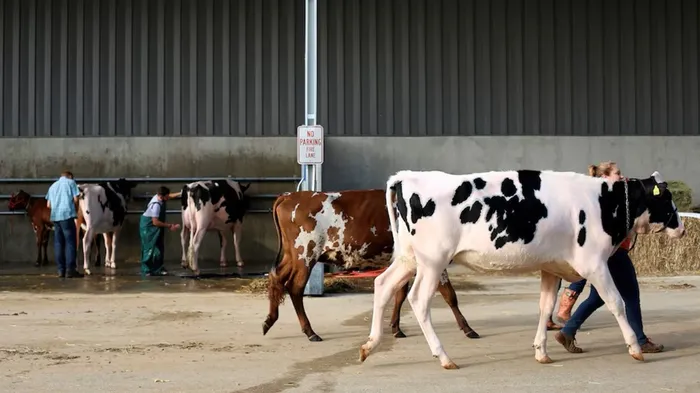South Africa's agriculture sees mixed fortunes as livestock industry battles disease
AGRICULTURE

Agricultural Business Chamber of South Africa (Agbiz) said that despite a robust recovery in field crops, fruits, and vegetables, the livestock industry continues to struggle due to the foot-and-mouth disease outbreak
Image: File Reuters, Ben Brewer
South Africa’s agricultural sector is experiencing uneven recovery in 2025, with strong gains in field crops, fruits and vegetables offset by persistent challenges in the livestock industry, according to the Agricultural Business Chamber of South Africa (Agbiz).
Agbiz chief economist Wandile Sihlobo on Monday said the latest data shows a robust recovery in crops and horticulture, supported by favourable rains, but warned that animal diseases continue to weigh heavily on livestock producers.
“From the high-frequency data, we are starting to see mixed fortunes. There is a robust recovery in field crops, vegetables, and fruits, thanks to good rains, but the livestock industry continues to struggle with animal diseases,” Sihlobo said.
However, he said the livestock industry continues to struggle with foot-and-mouth disease.
“We have also continued to struggle with foot-and-mouth disease and a few cases of avian influenza, particularly in the second quarter. It was at the end of the second quarter that the foot-and-mouth disease (FMD) vaccines arrived in South Africa for the start of the vaccination campaign.”
Dawee Maree, head of agriculture information and marketing at FNB South Africa, said the red meat sector faces a long battle with FMD.
“Biosecurity is high on the agenda for the livestock sector, but it will take time to completely sort it out. FMD is an economic disease that impacts production and profitability; it has no impact at all on humans (apart from the higher meat prices), and the meat we get in the retail market is completely safe for consumption," Maree said.
The uncertainty surrounding FMD remains a pressing issue, as echoed by Francois Rossouw, CEO of Southern African Agri Initiative (Saai).
In agreement with Agbiz's findings, Rossouw characterised the livestock industry as the weak link amid an otherwise mixed recovery.
“We still don’t know the full extent of the current FMD situation across provinces: official technical updates through late Q2 flagged ongoing outbreaks (notably in KZN), and new detections continued into July in the Free State, underscoring that spread and reservoirs are not yet fully mapped."
“Equally, it is unclear whether vaccine availability will match need in the short, medium, or long term. The government announced a rollout beginning mid-June with funding and procurement routed via Onderstepoort Biological Products (OBP), but public notices also acknowledged staged deliveries and significant budget requirements—leaving open questions about sustained supply, coverage cadence, and operational capacity to execute repeat rounds at scale.”
Despite these challenges, South Africa’s broader agricultural sector recorded growth. Stats SA figures show agricultural gross value added rose 2.5% in the second quarter on a seasonally adjusted basis, following an 18.6% surge in the first quarter.
Sihlobo said the softer second quarter figure reflected seasonal dynamics and delayed harvests.
“It is particularly such an issue that the second-quarter growth figure was much softer compared to the start of the year. We experienced a delay in our summer grain harvest, with more momentum occurring at the start of the third quarter than is typically seen in the second quarter," Sihlobo said.
"Indeed, we have ample summer grain and oilseeds, estimated at 19.55 million tonnes (up 26% year-on-year). However, the season was late by roughly a month and a half due to the excessively prolonged summer rains, among other factors.”
Sihlobo said that the sector’s sentiment remains optimistic, although it has softened in recent months.
“For example, the Agbiz/IDC Agribusiness Confidence Index (ACI) fell for a second consecutive quarter by 2 points to 63 in the third quarter of 2025. Despite the slight decline, the current level of the ACI implies that South African agribusinesses remain optimistic about business conditions in the country.”
BUSINESS REPORT